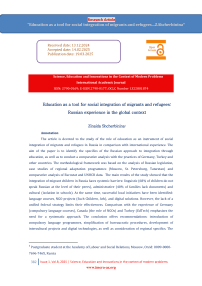Education as a tool for social integration of migrants and refugees: Russian experience in the global context
Автор: Zinaida Shcherbinina
Журнал: Science, Education and Innovations in the Context of Modern Problems @imcra
Статья в выпуске: 1 vol.8, 2025 года.
Бесплатный доступ
The article is devoted to the study of the role of education as an instrument of social integration of migrants and refugees in Russia in comparison with international experience. The aim of the paper is to identify the specifics of the Russian approach to integration through education, as well as to conduct a comparative analysis with the practices of Germany, Turkey and other countries. The methodological framework was based on the analysis of Russian legislation, case studies of regional adaptation programmes (Moscow, St. Petersburg, Tatarstan) and comparative analysis of Eurostat and UNHCR data. The main results of the study showed that the integration of migrant children in Russia faces systemic barriers: linguistic (68% of children do not speak Russian at the level of their peers), administrative (40% of families lack documents) and cultural (isolation in schools). At the same time, successful local initiatives have been identified: language courses, NGO projects (Such Children, Ark), and digital solutions. However, the lack of a unified federal strategy limits their effectiveness. Comparison with the experience of Germany (compulsory language courses), Canada (the role of NGOs) and Turkey (EdTech) emphasises the need for a systematic approach. The conclusion offers recommendations: introduction of compulsory language programmes, simplification of bureaucratic procedures, development of intercultural projects and digital technologies, as well as consideration of regional specifics. The scientific novelty of the article lies in a comprehensive analysis of barriers to integration and a comparative study combining legislative, practical and international aspects.
Social integration, migrants in Russia, language adaptation, children of migrants, NGOs, comparative analysis
Короткий адрес: https://sciup.org/16010333
IDR: 16010333 | DOI: 10.56334/sei/8.1.26


